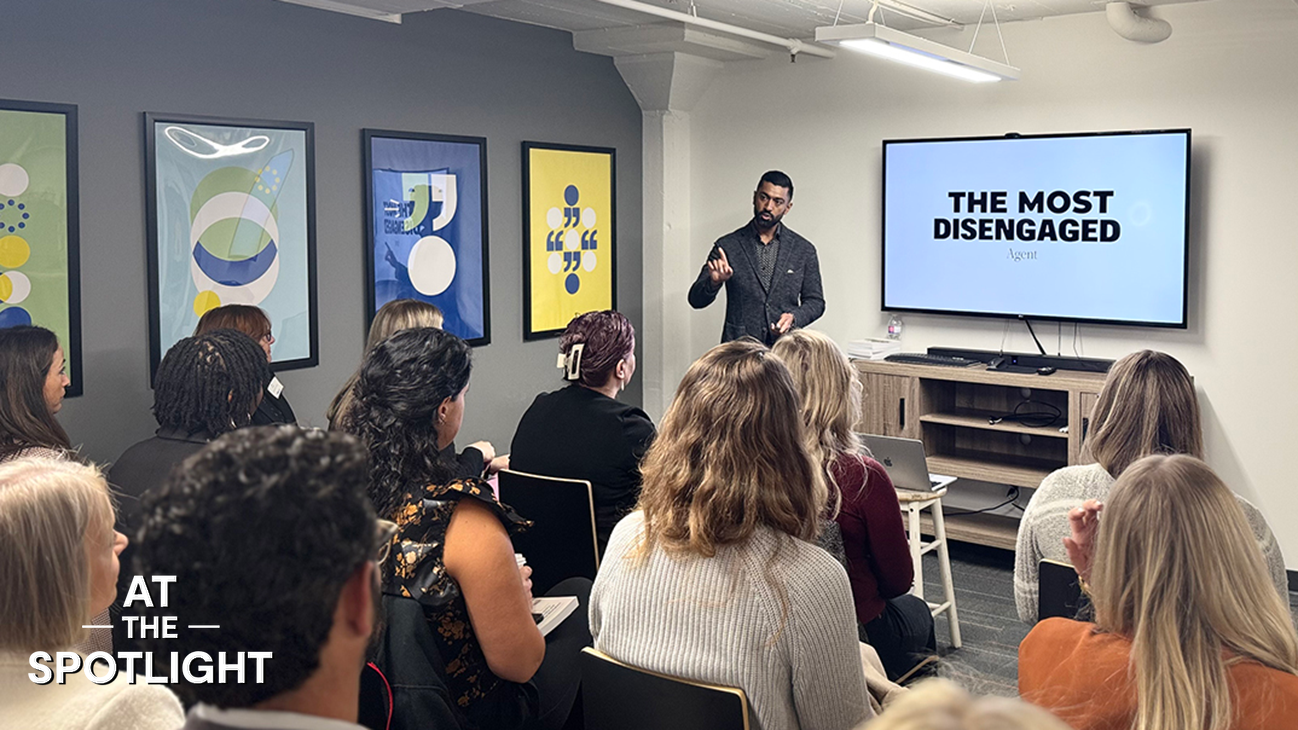Rehumanizing workplaces is the winning strategy of the future. With employee disengagement at an all-time high, embracing a more human-centric approach to work — one that puts people first — is the only way to drive long-term success. Hamza Khan, a future of work and leadership expert, shows leaders how to unlock the tremendous power of a loyal, thriving, and innovative workforce by shifting from outdated, top-down leadership models to a more inclusive, people-first approach.
Hamza recently joined us as part of our client-exclusive event series, At The Spotlight, where he presented his compelling keynote, “Rehumanizing Workplaces” — a bold call to action and practical guide that empowers culture champions, leaders, and changemakers to move beyond tradition and embrace leadership that values human connection.
It is the modern leadership imperative to co-create a thriving people-first culture, Hamza said, and he showed us how by outlining one challenge, one opportunity, and five skills to help us transcend survival mode and re-imagine the future of work.
The Challenge: A Disengaged and Dehumanized Workplace
A recent study published by Gallup found that only 15% of employees are engaged at work. The largest study of its kind, it surveyed nearly 3 million people over 10 years. The people most impacted by the brunt of this disconnection, Hamza said, are those most vulnerable — Gen Z, women, new hires, and frontline workers. Not only the future of an organization, he continued, but the future of society itself.
Leaders account for 70% of this disengagement, Hamza added. The statistics speak for themselves — “most leaders suck”. Or pick the word that you like, he continued, they are under-resourced, underprepared, overwhelmed, and, as a result repeating cycles of destructive behaviour they learned from their boss, who learned from their boss, etc.
The status quo has created a toxic cycle with many people promoted into leadership roles who have little leadership skills or opportunities for training. Shockingly, Hamza said, 60% of new leaders receive little to no training, and those who do are often in the latter half of their careers.
The Opportunity: Reimagining Leadership from the Ground Up
While the current state of leadership is disheartening, Hamza is optimistic about the opportunity to rebuild leadership systems in a way that truly serves people. He believes we can reimagine the modern workplace into inclusive, connected, and compassionate environments. It starts by today’s leaders closing some pesky gaps, Hamza said.
For example, on average leaders rank workplace dimensions associated with mental health and well-being 22% more favourably than employees. That’s a gap. 89% of leaders think their organization is sustainable compared to 41% of employees. 87% of employees believe they are productive in hybrid work environments, only 12% of leaders agree.
From these statistics, it’s clear that the realities of today’s leaders are out of sync from the realities of their employees, Hamza said. We need to get back in touch with each other. Effective leadership is no longer about imposing one’s will or inducing obedience, but about collaboration and co-creation. It’s about crafting solutions with people, not for them.
TOUCH: Five Skills for Rehumanized Leadership
The best way to close those gaps, Hamza said, is to operationalize the following five skills — superskills for today’s modern leaders. They’re contained within the acronym TOUCH:
- Transparency: Leaders must be open, inviting honest feedback and willing to ask the tough questions. Facilitate difficult conversations — it’s not enough to ask what’s working; they must also explore what’s not working and why.
- Openness: Be receptive to new ideas. Regular one-on-one check-ins should be prioritized, ideally once a week to ensure feedback loops are short and that employees feel heard. Spend the first 10 minutes on them, the second on you, and the final 10 minutes on coaching, Hamza said.
- Understanding: Instead of surface-level inquiries, leaders need to ask deeper questions to uncover the full picture.
- Compassion: A good leader can demonstrate sympathy, a great leader can demonstrate empathy, a transcendent leader is compassionate. They take active steps to relieve the pain and challenges their team members face.
- Humility: Leaders must unlearn some of the deeply ingrained beliefs from past leadership models and adopt a mindset where the needs of their people are as important as the mission.
The illiterate of the 21st century will be those who can’t learn, Hamza said. As leaders, we need to relearn, unlearn, and learn. Relearn leadership from a lens that assumes the best in people; unlearn past leadership lessons based on assumptions that people are lazy, unmotivated, and need to be pushed; and learn how to operationalize TOUCH to chase the dream, instead of lingering in today’s nightmarish work environments.
The People-First Leader
Hamza received the best leadership advice at the start of his first role in leadership. He was told to make himself obsolete. A tough concept to digest on your first day at a new job. But, through the years, Hamza learned and saw firsthand that true leaders create other leaders — they foster environments where people can be their best selves. The goal of leadership, he said, is not merely to grow the business, but to grow the people within it — this is the key to sustainable, thriving organizations.
Hire Hamza Khan to Speak at Your Event
Hamza’s own personal journey, which he shares vulnerably in his keynotes, is a testament to the power of rehumanized leadership. His story of experiencing workplace toxicity and overcoming the effects of poor leadership through therapy, coaching, and personal development serves as a powerful example of what it means to pave the way for workplaces that are not just functional, but truly human-centered.
Hamza’s keynotes are a rallying cry for a new era of leadership. His deep understanding of modern workplace challenges, combined with his actionable strategies, have made him an in-demand thought leader for organizations looking to cultivate people-first cultures and foster engaged, high-performing teams.
Contact us to learn more about Hamza and to book him to speak at your next event.




